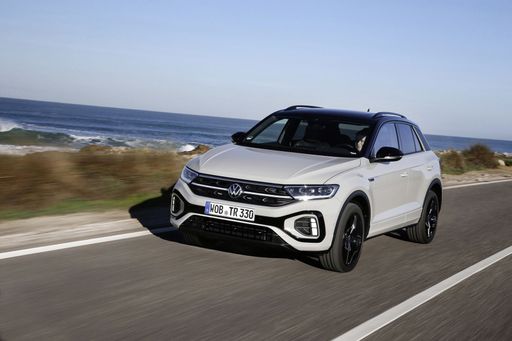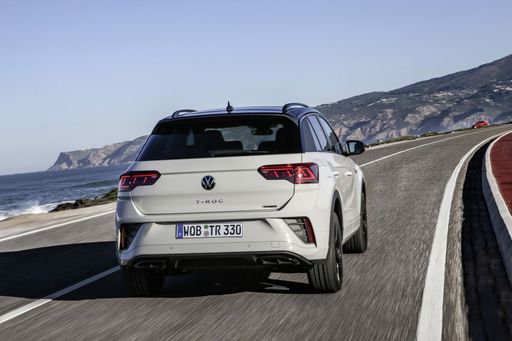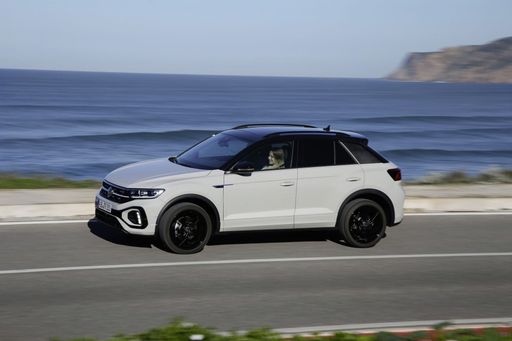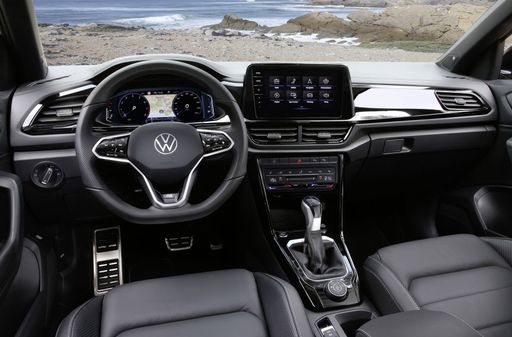Peugeot 208 vs VW T-Roc - Differences and prices compared
Costs and Efficiency:
Price and efficiency are key factors when choosing a car – and this is often where the real differences emerge.
Peugeot 208 has a noticeable advantage in terms of price – it starts at 20700 £, while the VW T-Roc costs 26400 £. That’s a price difference of around 5756 £.
Fuel consumption also shows a difference: Peugeot 208 manages with 4.50 L and is therefore noticeable more efficient than the VW T-Roc with 5.50 L. The difference is about 1 L per 100 km.
Engine and Performance:
Power, torque and acceleration say a lot about how a car feels on the road. This is where you see which model delivers more driving dynamics.
When it comes to engine power, the Peugeot 208 has a hardly perceptible edge – offering 156 HP compared to 150 HP. That’s roughly 6 HP more horsepower.
In acceleration from 0 to 100 km/h, the Peugeot 208 is slight quicker – completing the sprint in 8.30 s, while the VW T-Roc takes 8.90 s. That’s about 0.60 s faster.
In terms of top speed, the VW T-Roc performs slight better – reaching 212 km/h, while the Peugeot 208 tops out at 200 km/h. The difference is around 12 km/h.
There’s also a difference in torque: Peugeot 208 pulls minimal stronger with 270 Nm compared to 250 Nm. That’s about 20 Nm difference.
Space and Everyday Use:
Cabin size, boot volume and payload all play a role in everyday practicality. Here, comfort and flexibility make the difference.
Seats: offers more seating capacity – vs .
In curb weight, Peugeot 208 is clearly perceptible lighter – 1165 kg compared to 1465 kg. The difference is around 300 kg.
In terms of boot space, the VW T-Roc offers evident more room – 475 L compared to 352 L. That’s a difference of about 123 L.
In maximum load capacity, the VW T-Roc performs a bit better – up to 1350 L, which is about 187 L more than the Peugeot 208.
When it comes to payload, VW T-Roc a bit takes the win – 515 kg compared to 430 kg. That’s a difference of about 85 kg.
Who comes out on top?
Overall, the Peugeot 208 shows itself to be outperforms in nearly all aspects and secures the title of DriveDuel Champion.
It convinces with the more balanced overall package and proves to be the more versatile choice for everyday use.
 @ Peugeot / Stellantis Media
@ Peugeot / Stellantis Media
Peugeot 208
Costs and Consumption
View detailed analysis
Engine and Performance
View detailed analysis
Dimensions and Body
View detailed analysis
Peugeot 208
The Peugeot 208 feels like a city-savvy fox: compact, stylish and surprisingly grown-up, with a cabin that punches above its weight and enough personality to make daily commutes a little less boring. It’s a smart pick for buyers who want chic practicality without the showroom bluster — easy to park, thrifty to run and oddly fun when the road tightens up.
details @ Peugeot / Stellantis Media
@ Peugeot / Stellantis Media
 @ Peugeot / Stellantis Media
@ Peugeot / Stellantis Media
 @ Peugeot / Stellantis Media
@ Peugeot / Stellantis Media
 @ Peugeot / Stellantis Media
@ Peugeot / Stellantis Media
VW T-Roc
The VW T-Roc mixes cheeky, coupe-like styling with the everyday sense and space of an SUV, so it looks fun without sacrificing family sense. It’s a likeable all-rounder with tidy road manners and plenty of personality, ideal if you want a car that’s practical enough for chores but entertaining enough to enjoy.
details @ Volkswagen AG / VW Media
@ Volkswagen AG / VW Media
 @ Volkswagen AG / VW Media
@ Volkswagen AG / VW Media
 @ Volkswagen AG / VW Media
@ Volkswagen AG / VW Media
 @ Volkswagen AG / VW Media
@ Volkswagen AG / VW Media
 @ Peugeot / Stellantis Media
@ Peugeot / Stellantis Media
|
 @ Volkswagen AG / VW Media
@ Volkswagen AG / VW Media
|
|
|
|
Costs and Consumption |
|
|---|---|
|
Price
20700 - 35200 £
|
Price
26400 - 38000 £
|
|
Consumption L/100km
4.5 - 5.2 L
|
Consumption L/100km
5.5 - 6.3 L
|
|
Consumption kWh/100km
14.1 - 15.4 kWh
|
Consumption kWh/100km
-
|
|
Electric Range
362 - 432 km
|
Electric Range
-
|
|
Battery Capacity
46 - 51 kWh
|
Battery Capacity
-
|
|
co2
0 - 117 g/km
|
co2
126 - 143 g/km
|
|
Fuel tank capacity
44 L
|
Fuel tank capacity
50 L
|
Dimensions and Body |
|
|---|---|
|
Body Type
Hatchback
|
Body Type
SUV
|
|
Seats
5
|
Seats
4 - 5
|
|
Doors
5
|
Doors
2 - 5
|
|
Curb weight
1165 - 1530 kg
|
Curb weight
1465 - 1539 kg
|
|
Trunk capacity
309 - 352 L
|
Trunk capacity
284 - 475 L
|
|
Length
4055 mm
|
Length
4271 - 4373 mm
|
|
Width
1745 mm
|
Width
1811 - 1828 mm
|
|
Height
1430 mm
|
Height
1527 - 1573 mm
|
|
Max trunk capacity
1118 - 1163 L
|
Max trunk capacity
1350 L
|
|
Payload
380 - 430 kg
|
Payload
368 - 515 kg
|
Engine and Performance |
|
|---|---|
|
Engine Type
Petrol, Electric, Petrol MHEV
|
Engine Type
Petrol, Petrol MHEV
|
|
Transmission
Manuel, Automatic
|
Transmission
Manuel, Automatic
|
|
Transmission Detail
Manual Gearbox, Reduction Gearbox, Dual-Clutch Automatic
|
Transmission Detail
Manual Gearbox, Dual-Clutch Automatic
|
|
Drive Type
Front-Wheel Drive
|
Drive Type
Front-Wheel Drive
|
|
Power HP
101 - 156 HP
|
Power HP
115 - 150 HP
|
|
Acceleration 0-100km/h
8.3 - 10.9 s
|
Acceleration 0-100km/h
8.9 - 12.3 s
|
|
Max Speed
150 - 200 km/h
|
Max Speed
187 - 212 km/h
|
|
Torque
205 - 270 Nm
|
Torque
200 - 250 Nm
|
|
Number of Cylinders
3
|
Number of Cylinders
3 - 4
|
|
Power kW
74 - 115 kW
|
Power kW
85 - 110 kW
|
|
Engine capacity
1199 cm3
|
Engine capacity
999 - 1498 cm3
|
General |
|
|---|---|
|
Model Year
2023 - 2025
|
Model Year
2024 - 2025
|
|
CO2 Efficiency Class
D, A, C
|
CO2 Efficiency Class
E, D
|
|
Brand
Peugeot
|
Brand
VW
|
What drive types are available for the Peugeot 208?
The Peugeot 208 is offered with Front-Wheel Drive.
The prices and data displayed are estimates based on German list prices and may vary by country. This information is not legally binding.
